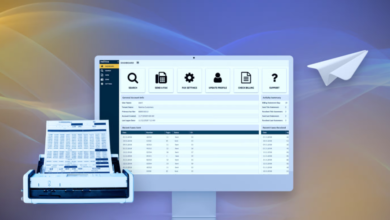Why Businesses Need Logistics Technology: Spotlight on Warehouse Management Systems

In the fast-evolving world of modern commerce, logistics has become the backbone of business success. Whether it’s a retail giant shipping products globally or a local e-commerce startup trying to keep up with online demand, efficient logistics can make or break an operation. At the heart of logistics success lies technology — and more specifically, the adoption of a warehouse management system (WMS). This powerful software tool helps businesses streamline warehouse operations, improve inventory accuracy, and deliver better customer service.
Let’s dive deeper into why logistics technology, with a special focus on warehouse management systems, is no longer optional but essential for businesses aiming to stay competitive.
The New Era of Logistics: Why Technology is Essential
The global supply chain has become more complex than ever before. With increased consumer expectations, rapid delivery demands, and intricate inventory requirements, businesses must move faster and smarter. Manual processes simply can’t keep up.
Technological solutions, especially logistics software, provide the agility, visibility, and control required to navigate modern logistics challenges. From inventory tracking to order fulfilment, automated systems reduce errors, improve speed, and offer real-time insights. The right logistics technology not only increases operational efficiency but also provides a measurable return on investment.
Among the various technological solutions available, a warehouse management system stands out as a cornerstone for companies looking to modernise their logistics infrastructure.
See also: Huawei Watch Fit 4: A Leap Forward in Wearable Tech
What Is a Warehouse Management System?
A warehouse management system is a software application designed to support and optimise warehouse functionality and distribution centre management. Its core functions include tracking inventory levels, managing storage locations, coordinating order picking and packing, and ensuring timely shipments.
Modern WMS platforms, such as CartonCloud’s Warehouse management system, also integrate with other business tools like transportation management systems (TMS), accounting software, and e-commerce platforms. This integration ensures seamless workflows, from order entry to last-mile delivery.
Key Benefits of a Warehouse Management System
1. Enhanced Inventory Accuracy
One of the primary challenges in logistics is maintaining accurate inventory records. Errors can lead to stockouts, overstocking, and ultimately lost sales or increased costs. A WMS uses barcode scanning, RFID, and real-time updates to ensure inventory is always accurate and up-to-date.
This means warehouse staff can quickly locate items, reduce mispicks, and improve customer satisfaction by fulfilling orders correctly the first time.
2. Improved Warehouse Efficiency
A warehouse is more than just a storage facility; it’s a dynamic environment with constant movement. A WMS helps manage space utilisation, streamline picking routes, and assign tasks based on real-time priorities. These improvements result in faster order processing and lower labour costs.
Systems like CartonCloud offer automation features that eliminate manual data entry and simplify tasks, making warehouse operations significantly more efficient.
3. Scalability and Flexibility
As businesses grow, their logistics needs evolve. A flexible warehouse management system allows companies to scale operations without increasing complexity. Whether you’re expanding to multiple warehouses or dealing with seasonal spikes in demand, a cloud-based WMS can adapt quickly.
Software like CartonCloud allows businesses to manage multiple warehouses, track performance metrics, and adjust processes as needed, all within a single platform.
4. Data-Driven Decision Making
Real-time data is invaluable in today’s business environment. With a WMS, managers can monitor warehouse performance, identify bottlenecks, and make data-driven decisions. Insights like average order fulfilment time, picking accuracy, and inventory turnover empower businesses to continuously improve operations.
This visibility is especially critical in industries like 3PL, e-commerce, and distribution, where precision and speed are vital.
Industry Use Cases: Who Needs a Warehouse Management System?
Third-Party Logistics (3PL) Providers
3PLs handle logistics for other companies, which means accuracy and efficiency are paramount. A WMS enables 3PL providers to manage multiple clients, automate billing, and provide transparency into inventory levels and shipments. For companies involved in vehicle logistics, arranging reliable services such as https://www.shiply.com/car-transporters/aberdeen-car-transporters can complement warehouse management systems by ensuring safe and efficient car transport.
E-commerce Businesses
In the world of online shopping, customers expect fast, accurate delivery. A robust warehouse management system helps e-commerce companies manage inventory across platforms, speed up order fulfilment, and reduce costly errors.
Wholesalers and Distributors
Wholesale businesses often handle high volumes of goods and require precise inventory control. A WMS streamlines receiving, storage, and distribution processes, ensuring that goods flow smoothly from warehouse to retailer.
CartonCloud: Simplifying Warehouse Management
For businesses ready to embrace logistics technology, CartonCloud offers an intuitive and powerful solution. Their warehouse management system is designed specifically for small to medium-sized logistics operations, offering the features of enterprise software without the complexity.
Key features of CartonCloud’s WMS include:
- Automated Data Entry: Reduce paperwork and manual errors.
- Mobile Access: Manage operations from anywhere via smartphone or tablet.
- Real-Time Inventory Tracking: Always know what’s in stock and where it’s located.
- Integrated Transport Management: Combine warehouse and delivery operations in one system.
- Client Portal Access: Provide customers with visibility into their orders and inventory.
By simplifying day-to-day operations and improving transparency, CartonCloud enables businesses to operate more efficiently and grow confidently.
Future-Proofing Your Logistics Operations
The world of logistics will continue to evolve, from advancements in AI and robotics to the growing importance of sustainability in the supply chain. Investing in a warehouse management system today sets the foundation for future innovation.
By adopting logistics technology, companies are better positioned to embrace automation, respond to market demands, and maintain a competitive edge. A well-implemented WMS is not just a tool for today’s operations; it’s a long-term asset for growth.
Final Thoughts
In an increasingly competitive and complex market, logistics technology is no longer a luxury, it’s a necessity. Businesses that embrace tools like a warehouse management system can streamline their operations, increase accuracy, and respond more effectively to customer demands.
Whether you’re a growing e-commerce brand, a third-party logistics provider, or a wholesale distributor, a reliable WMS like CartonCloud’s warehouse management system can be the key to unlocking operational excellence and sustainable growth.
Now is the time to evaluate your logistics technology stack. If warehouse inefficiencies, inventory issues, or order errors are slowing down your business, a smarter warehouse solution might be the answer.




